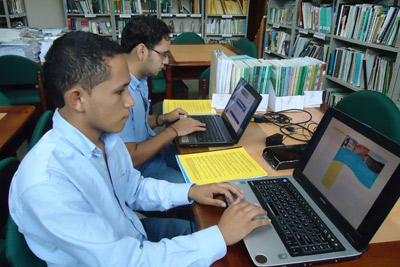TEEAL Electronic library resource expands its reach
By Stacey Shackford

For farmers, students and scientists in many parts of the developing world, access to agricultural journals has been spotty, outdated or nonexistent.
Now, researchers in El Salvador and Guatemala will have instant access to thousands of articles from more than 200 high-quality research journals in agriculture and related sciences, thanks to The Essential Electronic Agricultural Library (TEEAL) project, run out of Cornell's Mann Library.
With updated subscriptions, their colleagues in 84 other countries will also benefit from the latest annual update, recently released with nearly 30,000 new articles and several new publications, including 10 African journals and four Spanish journals.
Founded in the early 1990s on a belief that long-term improvements in food security and agricultural development would not be possible without giving scientists better access to current research, TEEAL is a searchable, offline, digital library available to public and nonprofit institutions in eligible-income countries.
The first set was shipped in 1999 to the University of Zimbabwe on 172 CDs, weighing 50 pounds. The library now fits on a single small 1TB hard drive, with this year's update delivered on a single 32GB flash drive.
In many cases, the resource is delivered at a reduced rate or no cost, because of support from the Technical Centre for Agricultural and Rural Cooperation (CTA) and the Bill & Melinda Gates Foundation. Publishers, in most cases, also donate the journals to TEEAL itself, allowing for the creation of a collection with an estimated value of more than $1 million.
Erica Reniff, head of TEEAL outreach and client relations, said 50 new institutions will be receiving full TEEAL sets this year with funding from CTA; additional promotional efforts are being directed to colleges or smaller sized institutions. Sub-Saharan Africa has been a primary target for several years, and recently the Caribbean and Pacific regions have become a focus, with 10 new clients joining the ranks, including the first institutions in El Salvador and Guatemala.
"A total of 115 countries are eligible for getting access to TEEAL, and we're currently working to attain new sales in Panama and Paraguay," Reniff added.
Clients attest that the resource is particularly valuable in areas where Internet and email access is unreliable or not available.
"For us, TEEAL is fundamental since it puts an infinity of information within reach, and updated information," said César Alvarado of the National School of Forestry Sciences in Honduras. "We are very pleased and feel lucky to have it since this will give all of our academic fields a greater range and depth."
Stacey Shackford is a staff writer at the College of Agriculture and Life Sciences.
Media Contact
Get Cornell news delivered right to your inbox.
Subscribe